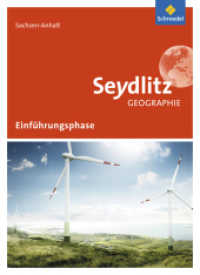- ホーム
- > 洋書
- > 英文書
- > History / World
Full Description
This handbook examines Pakistan's 70-year history from a number of different perspectives.
When Pakistan was born, it did not have a capital, a functioning government or a central
bank. The country lacked a skilled workforce. While the state was in the process of being
established, eight million Muslim refugees arrived from India, who had to be absorbed into a
population of 24 million people. However, within 15 years, Pakistan was the fastest growing
and transforming economy in the developing world, although the political evolution of the
country during this period was not equally successful. Pakistan has vast agricultural and
human resources, and its location promises trade, investment and other opportunities. Chapters in the volume, written by experts in the field, examine government and politics, economics,
foreign policy and environmental issues, as well as social aspects of Pakistan's development,
including the media, technology, gender and education.
Shahid Javed Burki is an economist who has been a member of the faculty at Harvard University, USA, and Chief Economist, Planning and Development Department, Government of
the Punjab. He has also served as Minister of Finance in the Government of Pakistan, and has
written a number of books, and journal and newspaper articles. He joined the World Bank in
1974 as a senior economist and went on to serve in several senior positions. He was the (first)
Director of the China Department (1987-94) and served as the Regional Vice-President for
Latin America and the Caribbean during 1994-99. He is currently the Chair of the Board of
Directors of the Shahid Javed Burki Institute of Public Policy at NetSol (BIPP) in Lahore.
Iftekhar Ahmed Chowdhury is a career Bangladeshi diplomat and former Minister of Foreign
Affairs in the Government of Bangladesh (2007-08). He has a PhD in international relations
from the Australian National University, Canberra. He began his career as a member of the
civil service of Pakistan in 1969. Dr Chowdhury has held senior diplomatic positions in the
course of his career, including as Permanent Representative of Bangladesh to the United
Nations in New York (2001-07) and in Geneva (1996-2001), and was ambassador to Qatar,
Chile, Peru and the Vatican. He is currently a visiting senior research fellow at the Institute of
South Asian Studies, National University of Singapore.
Asad Ejaz Butt is the Director of the Burki Institute of Public Policy, Lahore, Pakistan.
Contents
1 An overview Shahid Javed Burki
PART I Politics, theory and practice
2 The Pakistan story Shahid Javed Burki
3 Unintended consequences: The long shadow of Partition on Pakistan and India Subrata K. Mitra
4 Evolution of politics Shirin Tahir-Kheli
5 Islam, society and politics in Pakistan Riaz Hassan
6 Sustained political progress: The supportive role of the military Jehangir Karamat
7 The media in Pakistan: Idiom, ideology and the army Khaled Ahmed
PART II Pakistan's dependence on the outside world
8 Pakistan, power-play and a new South Asian paradigm Iftekhar Ahmed Chowdhury
9 The making of foreign policy: Changing parameters Aziz Ahmad Khan
10 Living in a rapidly changing world Shahid Javed Burki
11 Defenders of the crescent: Pakistan-Saudi Arabia relations Farah Jan
12 Adversarial peace: India-Pakistan nuclear rivalry Farah Jan
13 A potential game changer: The China-Pakistan Economic Corridor Daud Ahmad
PART III Economic development and the importance of good governance
14 Macroeconomic achievements and challenges Masood Ahmed
15 History of the development discourse in Pakistan Asad Ejaz Butt
16 Recent economic developments and prospects Farrukh Iqbal
17 Economic governance Ishrat Husain
18 Praetorian bureaucratization of the political system and politicization of bureaucracy Shahid Najam Contents
PART IV Social underdevelopment
19 Getting technology to work for social development Ayub Ghauri
20 Akhuwat: New microcredit stories Muhammad Saleem Ahmad Ranjha
21 Private sector in education Shahid Kardar
22 Educating and employing women Nasreen Kasuri
PART V Energy and the environment
23 The downward spiral of the quality of life in Pakistan: Is control possible, or even desired? Kulsum Ahmed
24 Water problems and solutions Mahmood Ahmad
25 Ways of solving the energy problem Ziad Alahdad
PART VI Conclusion
26 The last word Shahid Javed Burki
27 Postscript Shahid Javed Burki and Asad Ejaz Butt








